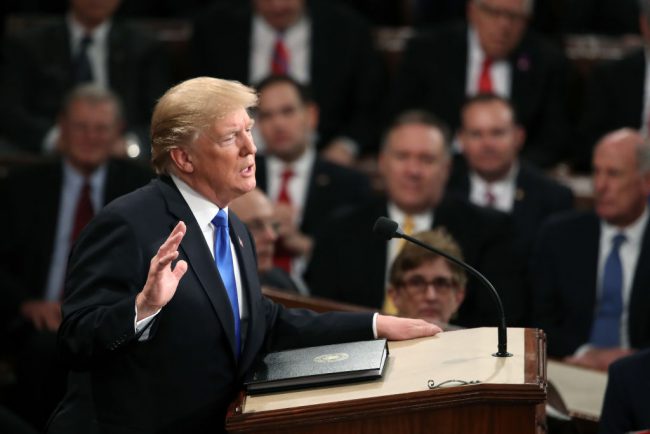The State of the Union address is a carefully structured ritual that’s more about hype than substance.

That’s why there was nothing really surprising about Tuesday’s address. The constraints of this presidential tradition even managed to reign in a political rebel like Donald Trump.
Everything about the annual address to Congress is scripted, timed and targeted with precision; from the politically-charged guest list to the carefully punctuated talking-points meant to generate applause.
That’s just the way it works — even for a president who once lambasted other politicians for using a TelePrompTer.
In other words, Trump said and did exactly what he was expected to, and no one should be surprised.
He talked tough on immigration, trade and North Korea, while adding a hefty dose of self-congratulatory messaging about the economy. He played up patriotic themes, while offering broad-strokes ideals for veterans, energy and health care.
But what stood out was the president’s attempt to re-imagine himself as the great unifier.

“I call upon all of us to set aside our differences, to seek out common ground,” he said. “We need to deliver for the people we were elected to serve.”

Get daily National news
Those scripted words quickly met the reality of a divided Washington – you could picture skeptics wondering, “Does he really believe that?”
There was no mention of the crude nicknames he so-often levels on his critics, and no acknowledgment of his own inflammatory comments that have divided Americans by race, religion or political creed.
Moments later, without a tinge of irony, Trump then proclaimed that his administration has “sought to restore the bonds of trust between our citizens and their government.”
This, despite his own track record of openly working to discredit the FBI, Department of Justice, U.S. intelligence agencies and the voting system as a whole.
Most Democrats refused to applaud. Members of the Congressional Black Caucus sat silently as Trump took credit for the falling unemployment rate among African-Americans (a trend which actually has more to do with the previous eight years under former president Barack Obama).
Trump’s immigration proposals were attacked as “explicitly racist” by a congressman from Illinois, while Rep. Joe Kennedy III indirectly called Trump a “bully,” during the official Democratic party response to the State of the Union.
By the time it was all over, the reaction from the left was just as predictable as the words delivered by the president. No surprises there.
What’s different this time around is that President Trump faces a different authenticity test than his successors might have.
Inevitably he will make it pretty clear whether he really means what he said, if he hasn’t already.
Just as well-rehearsed as the State of the Union address is the cycle of Trump being lauded as presidential just for sticking to script, only to undo that message within a day or two by saying something wild, or frankly, unfathomable.
He has proven over and over again that TelePrompTer Trump is not the same as everyday Trump.
He can, and probably will tweet or say something to undo the image he crafted for himself in fairly short order. That’s why Trump’s call for unity won’t be taken seriously by either side. How can it be, when it hasn’t been backed up by action?
For all the careful planning, the third-longest State of the Union address in history will quickly be forgotten.
Like everything else about this annual event, that’s just the way these things go.








Comments